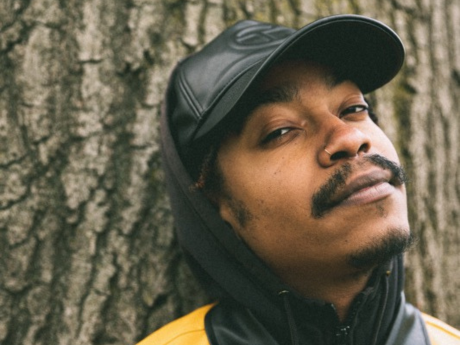Award Winners
The Writer Magazine/Emily Dickinson Award - 2024
Trace Howard DePass
Finalists
Brian Blanchfield
Andrea Jurjević
Claire Wahmanholm

ode to nas, ode to the cousin the cousin of death
anesthesia & euthanasia, two
cousins in the night of killing, hand you
two wrenches like lilies for all the pain
first - one buds like a point with no axis
from which the second blooms Fibonacci
spirals of petals which might cut any
other flower to the half-life. here, with-
in this act: the exact same corkscrewing
it takes to give a hand to a wrench, now,
euthanasia, like a cassette, rewinds
you to piles of nail, new york’s, no home.
anesthesia is that baby still young
enough to be a want, at home, sporting
a children’s toolbox, laughing, anything
[could be outside doors even death. look: here.]
Tawanda Mulalu on Trace Howard DePass
I’ve recently needed a poetics that commits to something beyond our contemporary tendency towards rhetorical realism in lyric. I worry that realism in lyric is an acquiescence to the way things are in the world, and so removes us from all sorts of radical and strange ways of speaking about the human, and what we can be to both ourselves and to one another. So, I’ve selected this poem partially in the belief that it does commit to an ever-surprising (and difficult, wonderfully difficult) voice that pushes me to more tenderly reconsider how I think about hope for a loved self in the midst of the desire to self-annihilate, in the midst of social circumstances that animate that desire to self-annihilate—and to somehow still live in the world despite that dark loop.
But mostly I’ve selected this poem because I think it’s rather damn good, from the jump, with its title invoking the famous Nas lyric from “N.Y. State of Mind”: “I never sleep, ‘cause sleep is the cousin of death.” The speaker then samples that disturbing sentiment into a blistering sonic flurry of associative leaps between “anesthesia & euthanasia” (cleverly echoing Nas’s “sleep” and “death”, which itself feels like an echo of Shakespeare’s Hamlet: “...To die, to sleep; / To sleep: perchance to dream: ay, there's the rub! / For in that sleep of death what dreams may come…”) Here, the poem’s continued obsession with looping, established by this coupling between the “cousins” of death and sleep, follows into another twisting pair: “wrenches” are likened (curiously) to “lilies” possessing “Fibonacci / spirals of petals.” Several deftly forced couplets then appear via half-rhymes and doubled rhythms (“new york’s, no home” is, I think, the best doubled trochee here, but the just-earlier “cassette, rewinds” is also such a dope way to end a line).
This poem presents, as I suggested earlier, some interpretive difficulty. Good. I was immediately drawn, then pushed away, then brought back into it because of how rewarding reading and re-reading it was both aurally and emotionally. And, yes, there is an actual prayer here, even with this idiosyncratic manner of praying. The literal cause of the “pain” the speaker feels isn’t explicitly stated but is certainly embodied vividly throughout. I understand the original Nas lyric as but one part of a long meditation on black social death in New York in the ‘90s—which remains real today. I imagine a similar kind of social death, albeit privately described, animates this speaker’s expressed desire for self-annihilation (via euthanasia as an anesthetic against life, or anesthesia to brave the process of euthanasia against life). But we still hear another echo of wanting something else besides such death, with the final rewind to “that baby still young / enough to be a want…” I imagine that this other wanting is why this poem ends with its bracketed whisper of complicated hope, which enacts a breaking within and of its ongoing loop, of a large “anything” that is simultaneously “outside” and “here.”
**
Trace Howard DePass is the author of self-portrait as the space between us (PANK Books 2018) & BOOTless → (Diode Editions 2024). His work has been featured with Poetry Foundation, Ours Poetica, Poet Lore, NPR's The Takeaway, SAND, Entropy, Split This Rock, Poetry Project, Bettering American Poetry, and the Academy of American Poets‘ Poem-a-Day series. DePass is a fellow with Poets House, Obsidian, and Teachers & Writers.
Finalists:
Brian Blanchfield is the author of three books of poetry and prose: Proxies: Essays Near Knowing, A Several World, and Not Even Then. He is the recipient of a Whiting Award, a Howard Foundation Fellowship, and the Academy of American Poets‘ James Laughlin Award, among other honors. His work has appeared in many publications, including Harper's, Chicago Review, BOMB, Brick, The Yale Review, Oxford American, Best American Essays, American Poets in the 21st Century, and Essential Queer Voices of U.S. Poetry. He lives in Missoula, where he is a professor of creative writing at the University of Montana.
Andrea Jurjević is the author of In Another Country (2022 Saturnalia Prize), Small Crimes (2015 Philip Levine Prize) and Nightcall. Her translations from Croatian include Olja Savičević’s Mamasafari and Marko Pogačar’s Dead Letter Office, which was shortlisted for the 2021 National Translation Award in Poetry.
Claire Wahmanholm is the author of Wilder (Milkweed Editions 2018), Redmouth (Tinderbox Editions 2019) and, most recently, Meltwater (Milkweed Editions 2023) which was a finalist for the 2024 Kingsley Tufts Poetry Award and the 2024 Minnesota Book Award. She was a 2020-2021 McKnight Writing Fellow, and her poem ”Glacier“ won the 2022 Montreal International Poetry Prize. Her work has most recently appeared in Sierra, the Hopkins Review, the Anarchist Review of Books, TriQuarterly, Ninth Letter, and Blackbird, and has been featured by the Academy of American Poets. She lives in the Twin Cities.
